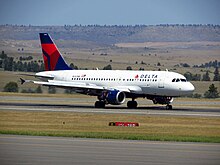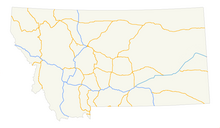Transportation in Montana
| Transportation in Montana | |||
|---|---|---|---|
 Construction sign for I-90 in Montana during the mid-20th century | |||
| Overview | |||
| Transit type | Rapid transit, commuter rail, buses, private automobile, taxicab, bicycle, pedestrian, highways | ||
| Website | http://www.mdt.mt.gov/ | ||
| Operation | |||
| Operator(s) | Montana Department of Transportation | ||
| |||
Transportation in Montana comprises many different forms of travel. Montana shares a long border with Canada, hence international crossings are prevalent in the northern section of the state; there are 13 road crossings and one rail crossing.
As the fourth-largest state in the United States,[1] journeying from one side to the other takes a long time. The state has an extensive network of roads, including state highways, Interstate highways and U.S. routes. Rail connections are also well-established and were an important method of transportation in Montana since the 1880s. Within individual cities, public transportation includes rapid transit and high-frequency bus services.
For travel further afield, 16 airports are operational within Montana. Bozeman Yellowstone International Airport in Gallatin County is the busiest airport and there are another seven major airports and eight minor ones providing commercial services.
Roads[]

Montana has approximately 70,000 miles (112,654 km) of highways which start in, pass through or are entirely inside the state.[2]
Prior to the creation of the state highway system and national numbered routes, a series of named auto trails traversed Montana and provided connections to other states. These included the Yellowstone Trail, Buffalo Trail, , and .[3]
Interstate highways[]
1,198.8 miles (1929.2 km) of the Interstate Highway System, which serve as a thoroughfare for long-distance road journeys, is contained within Montana, and all of these are maintained by the Montana Department of Transportation (MDT). Speed limits are generally 80 mph (129 km/h) in rural areas and 65 mph (105 km/h) in urban areas.
Montana's Interstate highways are as follows:[4]
 I-15 – Monida, Sweetgrass
I-15 – Monida, Sweetgrass
 I-115 – Butte, Downtown Butte
I-115 – Butte, Downtown Butte I-315 – Great Falls, Downtown Great Falls
I-315 – Great Falls, Downtown Great Falls
 I-90 – Mullan, Ranchester
I-90 – Mullan, Ranchester I-94 – Billings, Beach
I-94 – Billings, Beach
U.S. highways[]

Eleven national U.S. routes are within the state, as seen in the list below:
 US 2 – Troy, Bainville
US 2 – Troy, Bainville US 12 – Lolo Hot Springs, Marmarth
US 12 – Lolo Hot Springs, Marmarth US 20 – Henrys Lake, Yellowstone National Park
US 20 – Henrys Lake, Yellowstone National Park US 87 – Ranchester, Havre
US 87 – Ranchester, Havre US 89 – Yellowstone National Park, Carway
US 89 – Yellowstone National Park, Carway US 93 – Lost Trail Pass, Roosville
US 93 – Lost Trail Pass, Roosville
 US 93 Alt. – Kalispell Bypass
US 93 Alt. – Kalispell Bypass US 191 – Yellowstone National Park, Loring
US 191 – Yellowstone National Park, Loring US 212 – Red Lodge, Cooke City
US 212 – Red Lodge, Cooke City US 287 – Yellowstone National Park, Choteau
US 287 – Yellowstone National Park, Choteau US 310 – Frannie, Laurel
US 310 – Frannie, Laurel
Two former national routes also ran through Montana before they were replaced by Interstates: US 10 and US 91.


In addition to these primary routes, Montana has a large number of state highways and smaller secondary routes.[5] Speed limits on these roads are generally posted up to 70 mph (113 km/h) along rural areas.
Vehicles[]
Vehicles themselves in Montana are required to display a Montana licence plate on the back and front[6] by the Department of Motor Vehicles. Eight different primary plate designs have been issued since drivers were required to register their cars in 1913.[7]
Mass transit[]
Bus[]
The public transportation system in Montana is sparse as a whole, but several individual cities have local bus networks.
Intercity bus service[]
Across Montana, the bus network does not have a large amount of intercity routes but Greyhound Lines goes to 20 cities including Helena, Sidney and Bozeman, connecting passengers with journey frequencies of between once to five times per day.[8]


Local bus service[]
Some individual cities have their own bus network provided by a transit corporation.
Missoula is served by ASUM Transportation[9][10] and Mountain Line;[11] The Mountain Line public transit system runs twelve services around the city and the University of Montana. It is indirectly controlled by the local government which have appointed members onto the board of the transportation district.
Billings is served by MET Transit[12] and Great Falls[13] by Great Falls Transit.[14][15]
All four agencies run routes with fairly frequent schedules allowing commuters quick movement around different areas of the cities.
Railroads[]
Historically, the state was traversed by the main lines of east to west transcontinental routes: the Milwaukee Road, the Great Northern and the Northern Pacific.[16]
All passenger rail in Montana is provided by Amtrak. Twelve stations exist within the state.[17] All along the line Empire Builder, they serve communities along the most northern section of Montana which carries on out either side into Idaho and North Dakota.
In terms of freight transportation, the BNSF Railway is the largest freight railroad with 1,983 miles (3,191 km) of track in Montana. The Class II Montana Rail Link operates 817 miles (1,315 km) of track leased from BNSF within the state. A number of other small railroad companies also exist.[18]
Many now-defunct historical railroads existed in the industrial period of the 19th and early 20th century:[16]
- Heron Lumber Company, Arlee, 1925 – 1933
- Donlan Company, Arlee, 1920 – 1928
- W. H. Best, Bigfork, 1937 – 1947
- Billings Traction Company, Billings, 1910 – 1917
- Billings & Central MT Railway, Billings, 1931 – 1921
- Rocky Fork & Cooke Railway, Billings, 1890 – 1898
- Western Lumber Company, Bonner, 1912 – 1928
- Big Blackfoot Midland Railroad, Bonner, 1903 – 1915
- Big Blackfoot Milling Company, Bonner, 1900 – 1915
- Anaconda Copper Mining Company, Bonner, 1904 – 1949
- The Camp Creek Railway, Bozeman, 1912 – 1914
- Gallatin Valley Railway, Bozeman, 1910 – 1918
- Butte Electric Railway/Butte City Street Railroad, Butte, 1886 – 1937
- Montana Railway, Butte, 1884 – 1908
- Montana Union Railway, Butte, 1886 – 1898
- Montana Southwestern Railway, Butte, 1931 – 1933
- Gaylord & Ruby Valley Railway, Butte, 1898 – 1899
- Butte, Anaconda & Pacific Railway, Butte, 1894 – 1985
- The Montana Central Railway, Central Montana, 1887 – 1907
- White Sulpher Springs & Yellowstone Park Railway, Central Montana, 1911 – 1980
- Montana Railroad Company, Central Montana, 1897 – 1910
- The Milwaukee Road, 1928 – 1980
- Burlington Northern Railroad, 1970 – 1996
- F. H. Stoltze Land & Lumber Company, Columbia Falls, 1933 – 1946
- State Lumber Company, Columbia Falls, 1913 – 1933
- A. O. Westburg Lumber Company, Columbia Falls, 1915 – 1932
- Columbia Lumber Company, Columbia Falls, 1917
- American Timber Company, Dayton, 1938 – 1940
- Hans Larson, Dayton, 1934 – ?
- Mann Lumber Company, De Borgia, 1908 – 1925
- Eureka Lumber Company, Eureka, 1915 – 1922
- P. L. Howe Lumber Mills, Eureka, 1919 – 1922
- Brooks-Scanlon Lumber Company, Eureka, 1922 – 1926
- Lincoln Logging & Lumber Company, Fortine, 1911 – 1918
- Rocky Mountain Railroad Company of Montana, Gardener, 1883 – 1898
- Missouri River Railway, Glendive, 1912 – 1914
- Helena Street Railway, Helena, 1886 – 1927
- Jessup Milling Company, Jessup, 1911 – 1917
- Dawson Lumber Company, Libby, 1910 – 1911
- The Shields River Valley Railway, Livingston, 1901 – 1914
- Montana Eastern Railway, North East Montana, 1913 – 1928
- Great Northern Railway, 1889 – 1970
- Polleys Lumber Company, Ronan, 1911 – 1934
- Harper Logging Company, Victor, 1940 – 1947
- Northern Pacific Railway, 1896 – 1970
- Gilmore and Pittsburgh Railroad, Armstead — Salmon, Idaho, 1910 — 1939
Aviation[]


Commercial air travel is common in Montana and there are up to 71 public and private airports in the state. The largest is Bozeman Yellowstone International Airport, located eight miles northwest of Bozeman, an hour and forty minutes away by road from Helena.[19] The next largest is Billings Logan International Airport, near Billings, which has three runways and had over 388,000 enplanements in 2010.
The busiest domestic destinations from Montana are Denver, Colorado, Minneapolis, Minnesota and Salt Lake City, Utah, and the main airlines are Delta Air Lines and United Express.[20]
See also[]
References[]
- ^ "States in order by size". State Symbols USA. Retrieved August 17, 2013.
- ^ "Governor's Office of Economic Development | Infrastructure | Transportation". Montana.gov. Archived from the original on April 1, 2013. Retrieved October 10, 2013.
- ^ Boswell, Evelyn (November 9, 1997). "Trail tracker studies the evolution of Montana roads". Great Falls Tribune. p. 1P. Retrieved December 8, 2021 – via Newspapers.com.
- ^ "Route Log- Interstate Routes in Each of the 50 States". Federal Highway Administration. Retrieved August 17, 2013.
- ^ "Montana Highways Index". Retrieved August 17, 2013.
- ^ "Which states require a front license plate?". CarsDirect. Retrieved August 24, 2013.
- ^ "License Plate History". Montana Department of Justice. Retrieved August 24, 2013.
- ^ "Locations : States : Montana". Greyhound.com. Retrieved August 17, 2013.
- ^ "ASUM Transportation" (PDF). National Transit Database. Archived from the original (PDF) on November 11, 2015. Retrieved August 21, 2013.
- ^ "ASUM – Office of Transportation – The University of Montana". Life.umt.edu. Archived from the original on June 27, 2016. Retrieved August 17, 2013.
- ^ "Missoula Urban Transportation District (Mountain Line)" (PDF). National Transit Database. Archived from the original (PDF) on March 4, 2016. Retrieved August 21, 2013.
- ^ "Billings Metropolitan Transit" (PDF). National Transit Database. Archived from the original (PDF) on March 3, 2016. Retrieved August 21, 2013.
- ^ "City of Billings, MT – Official Website". MET Transit. August 1, 2013. Retrieved August 17, 2013.
- ^ "Great Falls Transit District (GFTD)" (PDF). National Transit Database. Archived from the original (PDF) on March 3, 2016. Retrieved August 21, 2013.
- ^ "Great Falls Transit District". Retrieved August 21, 2013.
- ^ a b "List of railroads of Montana". Railroads of Montana. Retrieved August 17, 2013.
- ^ "Feasibility Report on Proposed Amtrak Services in Southern Montana" (PDF). Montana Dept. of Transportation. p. 23. Retrieved August 17, 2013.
- ^ "Montana Rail System Map" (PDF). Montana Department of Transportation. Retrieved August 27, 2013.
- ^ "Distance between Bozeman, MT and Helena, MT". Retrieved August 21, 2013.
- ^ RITA | BTS | Transtats
- Transportation in Montana
- Transportation planning

